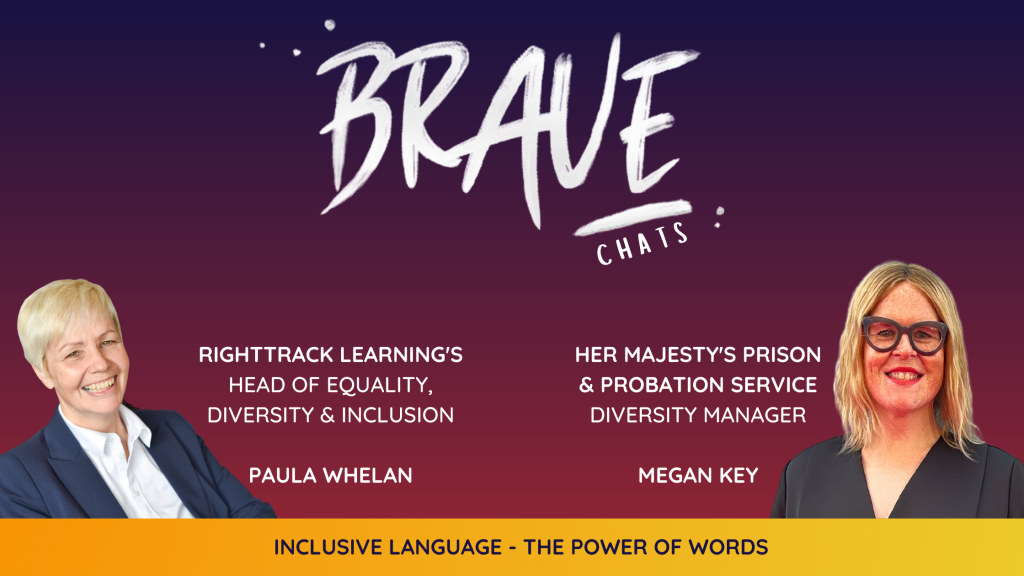Inclusive language is a term we get asked about daily – whether it be in our training sessions or whilst having a planning meeting with a client.
Throughout day-to-day conversation, our implicit biases may influence our language – sometimes unintentional but the result can be extremely impactful on someone’s identity and their sense of belonging.
For example, referring to a group of people as ‘Ladies and Gentlemen’, assuming that your friend’s boss is a male because of their senior job role, or stating that a candidate needs ’10 years experience’ on a job advertisement.
Language is forever evolving, but we have the power to evolve with it as long as we educate ourselves.

We spoke to Megan Key, Diversity Manager at Her Majesty’s Prison & Probation Service, about why inclusive language is important for organisations to promote.
Megan has been a public servant for 17 years, first as a Probation Officer and then moving into operational and strategical management. For 13 years, she has also been a transgender activist and within that she has volunteered, campaigned and spoken on a range of experiences affecting trans people including mental health, addiction and workplaces.
Let’s start with the basics – why is inclusive language important?
Megan: In a humane society everybody deserves respect and compassion, I believe it a human right. It isn’t difficult to be kind and connecting with other people means demonstrating a commitment to seeing them for who they are. Inclusive language is the beginning of this commitment.
What steps can an organisation take to ensure inclusive language is promoted?
Megan: First, define what is meant by ‘inclusive language’. There is an increasing polarisation in political views in society at the moment, much of which is bound up in what is known as ‘identity politics’.
Organisations can create an inclusive culture by being clear about their values and their expectations of staff concerning respect, tolerance and fairness.
Secondly, use inclusive language in your policies, communication strategies and processes, ensuring attention to detail, weaving it into everything the organisation does.
Thirdly, be tuned in to political discourse in terms of equality, diversity and inclusion because language evolves, sometimes rapidly in relation to world events and political movements (such as Black Lives Matter and Transgender Rights), leading to passionate, often opposing views being exhanged widely thanks to social media. It is crucial to understand the impact on minority groups if organisations want to ensure a harmonious culture where people can thrive.
And where should an organisation start?
Megan: Lead from the top down and set expectations that all staff have a part to play in delivering inclusion. Here’s some examples:
- Get specialist D&I input
- Consult with community organisations
- Ensure senior leaders understand the challenges and experiences of marginalised staff through data collation and analysis
- Set an inclusion strategy and action plan that is measurable
- Quantitative and qualitative data is important
- Understand Equalities legislation and the business case for diverse, inclusive workplaces.
How do you measure success when it comes to diversity and inclusion?
Megan: Of course data is important, whether it’s analysing your workforce diversity, the talent pipeline or who’s leaving your organisation.
But, listening to lived experiences, asking your staff and customers about their perceptions is crucial. Sometimes organisations only see people as homogenous statistics, thinking that all black people or all gay people experience the world in the same way. People are individuals, we are intersectional and complex and qualitative surveys and interviews will tell you more than percentages can. Nuance is important.
Your organisation’s performance is likely to trend higher if your workforce is happy, if your customers feel valued for their diversity and you are more likely to retain talent.
What should be on an organisation’s agenda in 2022?
Megan: Hate crime is increasing in the UK, Brexit and geopolitics globally, the rise of populism in particular, has made marginalised groups anxious.
We’ve seen over the last few years the ways in which social media, such as Twitter and Facebook, has become a key tool in sharing new ideas, organising politically and advancing causes, on all sides of debates concerning identity. The dialogue can be simultaneously reconciliatory and divisive. I believe that now, in 2022, it is crucial to remind staff about inclusion, belonging and compassion. Organisations have an opportunity to create safe spaces to discuss differences of opinion and listen to lived experiences. Walls come down when people listen to each other; we are all human, we all want to avoid suffering and when people can see what they have in common, we create empathy.
Our ethos is ‘We Believe in Brave’, what does being brave mean to you?
Megan: Brave to me means being honest with ourselves and each other, accepting that to be human means to be flawed. I am flawed, I make mistakes. There is no shame in being flawed and if we allow ourselves to be vulnerable enough to be seen for who we really are, rather than trying to project a façade that protects our ego, then that bravery is rewarded in deeper connections and a richer experience of what it is to be human.
Bespoke training courses
RightTrack Learning is home to a family of learning and development specialists who, through the design and delivery of tailormade training solutions, support organisations just like yours to nurture inclusive workplaces, modern-day leaders and customer service superstars.